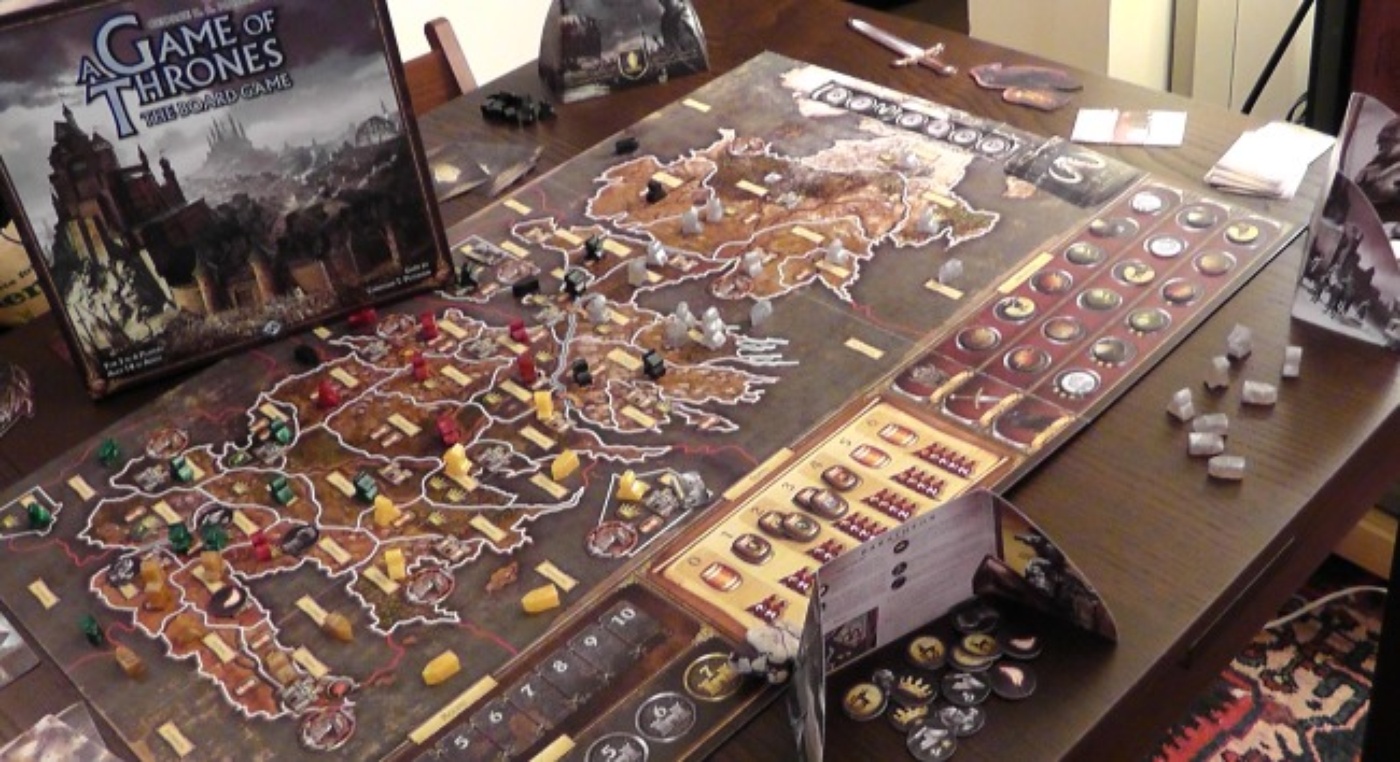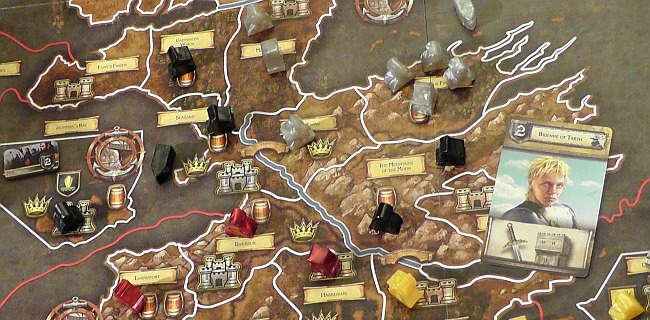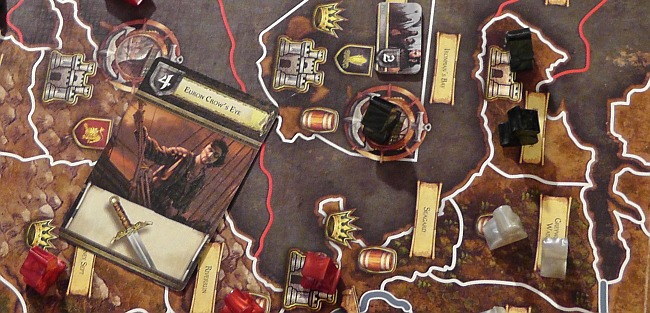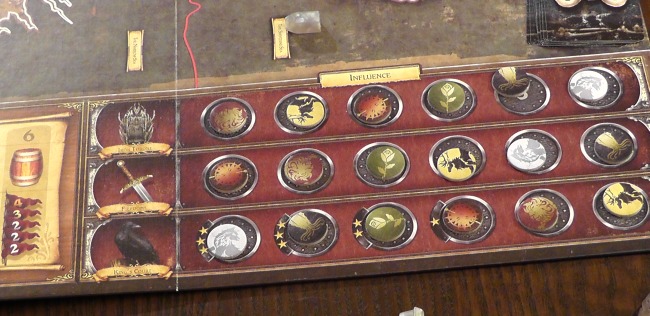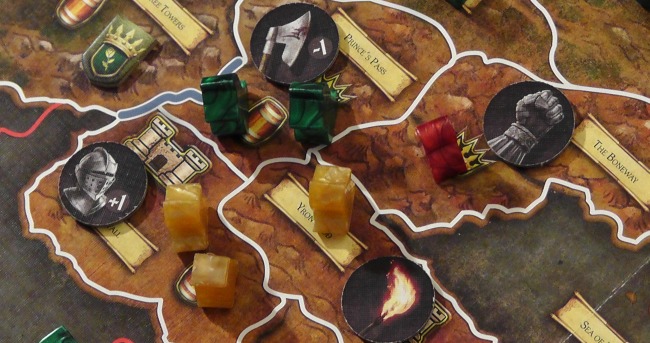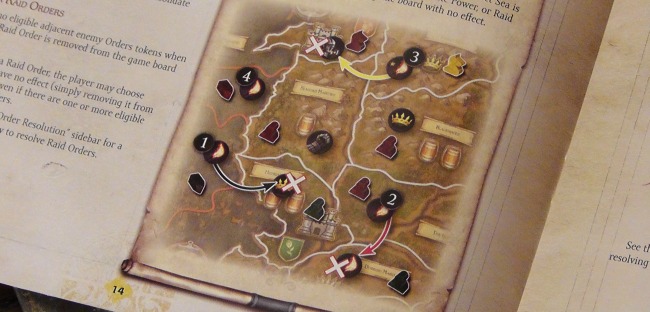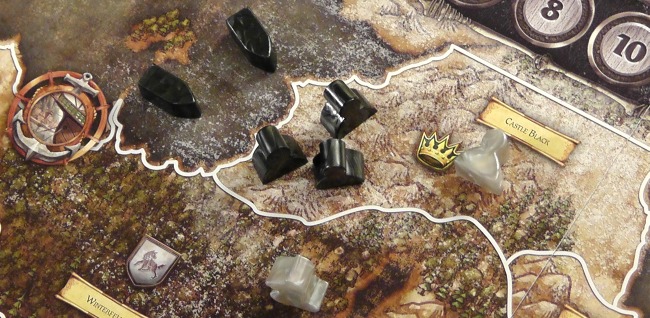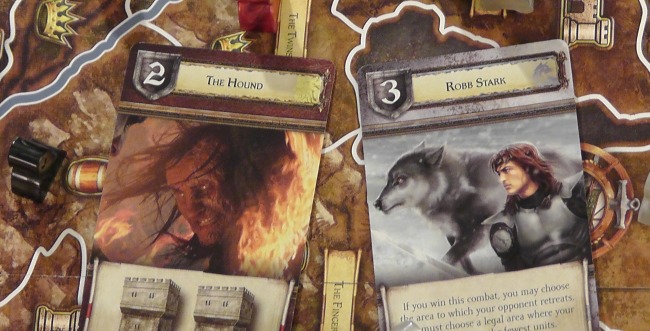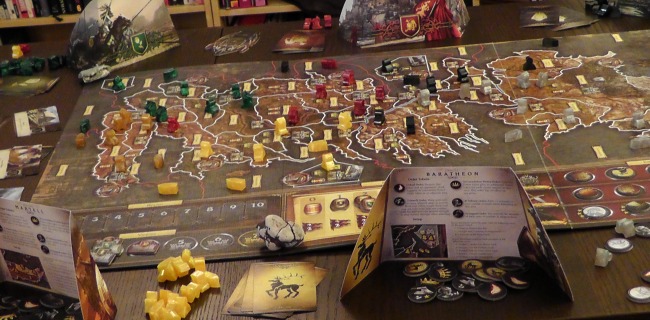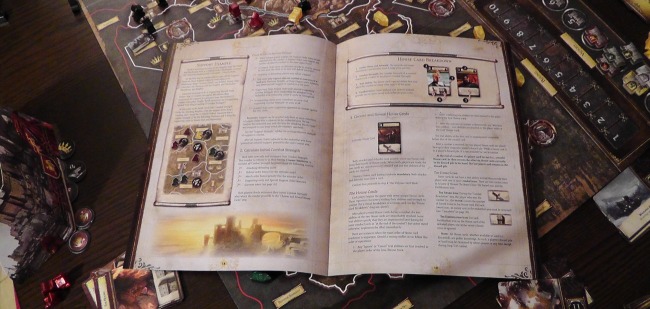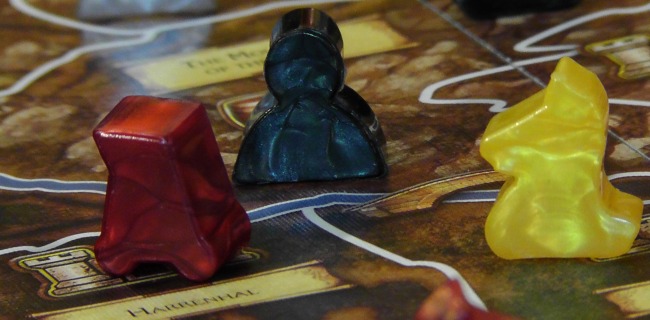Quinns: This month saw the release of a beautiful new edition of the Game of Thrones board game, a game of duplicity and scheming that, according to rumours, is so mean it’s actually capable of damaging friendships. Yesterday Paul and I played it, and today we seek to answer two very serious questions. One, should you buy it? And two, following his incredible defeat, will Paul manage to assemble an objective opinion?
Paul: I’m not bitter! There’s a lot about A Game of Thrones I want people to know, but they can start by knowing I was graceful in defeat. Under my rule House Tyrell were a staunch and honest ally for the entire game, which definitely wins me the moral victory.
Quinns: Aw! You must tell me how that feels, because I only know what it’s like to win the actual game of thrones. It’s also interesting you’re talking ethics when you spent the entire game convincing my neighbours to war against me.
Paul: I console myself with the terrible truth that success in A Game of Thrones means being a very, very bad person. Someone with no moral fiber, that maidens flee from and dogs turn their noses up at. Just like in the books, then.
Quinns: Absolutely. This game’s biggest success is how it feels worryingly like taking part in the baleful power struggles of George R.R. Martin’s novels. Click on through to read how we discovered that this game would make both the best and worst Christmas present imaginable.
Paul: A Game of Thrones is a grand strategy board game for three to six players where each of you controls a House vying for domination over the fantasy land of Westeros, but it’s not about slow, plodding planning. No. It’s a mix of diplomacy and deception. It’s cruel, tense and very personal.
The box says the game takes two to four hours, which sure is optimistic! Our game took over six hours, and while you could shave some time off that if you all already knew the rules, we weren’t bickering and brokering deals as much as we could have been. If your group loves to talk or even roleplay, this game could probably fill eight hours.
A quick description might call it a more political and rather more intense version of Risk, but I’d feel mean if I said that. There’s a lot more going on here than goes on in a game of Risk.
Quinns: Yes, which is immediately apparent from the moment you sit down at a table covered in little laquered men and cards and a massive board and SO MUCH BEAUTIFUL STUFF.
Each of you will be dispatching nobles, armies and navies to fight over the twenty castles on the map, with the first player to hold seven of them winning immediately, though this is comparable to trying to hold seven basketballs. The game also ends after ten turns, whereupon he or she holding the most castles wins.
Every player begins with a modest and secluded chunk of Westeros, but to expand both your economy and political influence you’ll have to grab more land. By the end of the first turn everybody will have developed borders with two or three other Houses, which is where things get interesting. Players can barely field enough armies to protect two borders, let alone fight two wars, so it’s in everyone interests to make friends fast.
Paul: Good friends would include Houses that have wormed their way to the top of the game’s three influence tracks. Whoever’s at the top of the Iron Throne track holds a tenuous rulership over the land and decides all ties in the game. The Fiefdoms track beneath it decides ties in battles, and the King’s Court track allows players to swap out one of their order tokens for another.
Quinns: Those order tokens are what make Game of Thrones a Devious Bastard’s Game instead of a wargame. Come with me, friend, on a journey into the heart of darkness.
Every turn starts with all players simultaneously assigning orders to their armies by putting a token face-down in each region. These orders can be defensive, offensive, support, raids or the politics-boosting and entirely peaceful “Consolidate Power”. Only when everyone’s placed their orders are the tokens flipped and revealed, letting you see that your peaceful House Stark neighbours are raiding your lands, those Lannisters bordering you to the South have received marching orders while Baratheon aren’t, in fact, supporting your push East. Which is fine, because you probably aren’t doing anything you promised either.
Strategy gamers will find themselves very much not in Kansas anymore. Shuffling units around the map in clever ways is actually less important than making the most of who trusts you, since the only thing in this game more powerful than an alliance is the invasion of an unsuspecting ally.
The rules explicitly state that nobody can show anyone else an order token before they’re all flipped and made public, meaning alliances and cease-fires are at all times based on trust. The horror. Simply put, it’s this order token mechanic that makes Game of Thrones the fearsome, fantastic, entirely faithful game it is. Everything else is almost window dressing.
It’s also what makes Game of Thrones a game that destroys relationships. On three occasions in our game – the repelling of a Stark invasion of Greyjoy’s foothold in the mainland, a sudden Greyjoy invasion of Lannisport and the undignified destruction of some Tyrell forces down South – players were reduced the kind of polite yet utterly transparent fury that I know, had we been kids, would have seen players walking away from the table to have a cry.
Paul: But we’re not kids and so we didn’t, and of course the best friends are the ones you can betray, get mad at, or invade at a moment’s notice and they won’t put laxatives in your beer the next time you come round to visit, right? Right, Quinns? Quinns?
The thing is, even after you’ve flipped your order tokens it’sstill possible for people to surprise one another, or wrangle new and ever wickeder deals.
One of the cruelest plays in the game is to tell a player you’ll support their attack, reveal a support token as normal, then actually support the other side when the battle is met. But you could go even further than that. Units that lose a battle are tipped on their side and considered “routed”, leaving said colossally odious player free to march on these routed attackers that were expecting your support, delivering the final blow that removes their miniatures from the game even as you conquer their territory.
Quinns: You make it sound like a miserable way to play, but winners simply cannot be wimps here. A common complaint about these sorts of games is that the higher someone climbs on the greased pole of the victory point track, the more likely the rest of the table are to put aside their differences to yank them back down, meaning the only way anyone is ever going to win is by picking their moment with the patience of a saint before making their play with the speed and mercy of a wet cat.
Paul: And you’d know all about that, wouldn’t you?
Quinns: Yes. Towards the tail-end of our game I was strong enough that for three turns straight I hatched plans that would, with a lot of luck, win me the game right there. And for three turns straight the lot of you took time out of your wars to drown that luck in the bogs and latrines of the land. By the third hour of having such an agonisingly close victory denied to me I needed a lie down. Every turn was the same- incredible adrenaline rush, followed by a brutal surge of disappointment. It was a lesson in how smart you have to be to end the game early.
Paul: See, I was right to turn others again you-
Quinns: To try and turn them against me. Didn’t work out so well, as I remember. Maybe if you were prettier.
Paul: Or bustier. But my plotting was wholly vindicated. It explains why you sat there sweating and mumbling for so long, too. A clear sign of too much ambition, of being unable to handle the tension.
Quinns: Speaking of tension, let’s talk about the hateful, beautiful commander cards.
So, everyone gets a hand of characters who make up the nobility of their House. Each participant must play one of these cards, secretly, into each battle. Some commanders simply give a big, fat bonus to your army’s combat value, while others allow you to pull wily tricks. More pertinently, some of your commanders are incredible and some are so shit you’ll wince at the idea of using them.
The thing is, once you’ve committed one of your commanders to a battle you can’t use them again until you’ve cycled through all the rest. Imagine that you sent them out somewhere to lead a campaign. You can’t simply expect them to be available for the next engagement.
It’s thematically reasonable, but in practice it’s almost comedically mean. The game is demanding you voluntarily penalise yourself from time to time in a game where all battles are important. Worse, if you think you’re going to lose a fight then playing your worst commander makes sense, but if your opponent knows you’ll do that then he can chuck in a terrible commander too, which means if you play a good one you might actually WIN, which means… you get the idea. It’s an excellently unpleasant little mind game where every competent commander you send into your discard pile marks you as an easier target for the other Houses.
Paul: Perhaps you’re now seeing why this would be both an excellent and terrible Christmas present. It’s a gorgeous game. Smart, cruel and pretty in equal measure. A perfect present for that special boy or girl in your life who’s both a gamer and a Song of Ice and Fire fan.
But board games received on Christmas day tend to be played on Christmas day, and a list of games I’d rather play with my drunk relatives would be as long as my leg and include spin the bottle. Even if everyone understood what the crap they were doing, someone getting betrayed and entering a year-long sulk is a very real prospect. And you know how we said it’s a little more complex than Risk? Sometimes, it shows.
Quinns: It shows through twenty-nine pages of rules typed out in a tiny font, for starters. If an accurate simulation of the source material is AGoT’s biggest success, the flabbiness of its rules are its biggest failing.
I’ve got to get this out of my system: This game is more complex than it had to be, and twice as complex as it should have been to appeal to any non-gamers who simply love A Song of Ice and Fire. It took me a twenty minute monologue to explain the rules to you lot, and I felt like an asshole for at least nine of those minutes because I was explaining the nuances of ports. And there were still at least half a dozen instances after we’d started where I had to inform you that you couldn’t do that move you’d hinged your strategy on because “it’s against the rules.”
It bugs me because social interaction and deal brokering are what make this game both unique and entertaining, but my god there’s a lot of nerdy fluff in between. If Fantasy Flight were insistent on having a game this complex, why not add political marriages and hostage exchanges instead of tiny marbled siege engines and a system where you all occasionally send troops to the Wall to bring about a variety of underwhelming penalties and rewards.
All right, I’m done. Final thoughts, Paul of House Tyrell?
Paul: I feel a bit mean wrapping up this review already as not all of that nerdy fluff is without merit, like the blind auctions for the influence tracks, but the most important thing to remember is that A Game of Thrones is A Game of Dirty Politics and it’s a great chance to enjoy some scheming.
The anecdote that this game can damage friendships isn’t hyperbole, though, and I think gaming groups out there should be wary that they’ll be expected to manipulate, lie and betray one another. But then, it’s important to remember what the title is, I guess: A Game of Thrones. You might feel sour after a terrible loss, but do you really expect to win every game you play?
Perhaps it’s best to consider A Game of Thrones the ultimate test of your quality as a player, as to whether you’re able to pack up your animosity along with the game. If bitterness dies fast in your circle of friends, then consider the ability to betray, burn and backstab them as a wonderful asset in your friendship and that’s one more reason to pick this game up.
Quinns: It’s interesting, because those betrayals and unexpected attacks are so incredibly unpleasant to be on the receiving end of. Yet because the possibility of them is always there, the game as a whole benefits as every turn becomes unbelievably tense.
Shut Up & Sit Down recommends, then? God, I’m desperate to play it again, but the idea actually makes me nervous. There’s no other game I can say that about.
Paul: We recommend. That is, we recommend it if you don’t mind taking a game to get the rules firm in your mind and, of course, if you don’t take getting manipulated, ganged-up on, brutalised or outwitted too seriously. But if you can’t handle the cold, get off the Wall.

